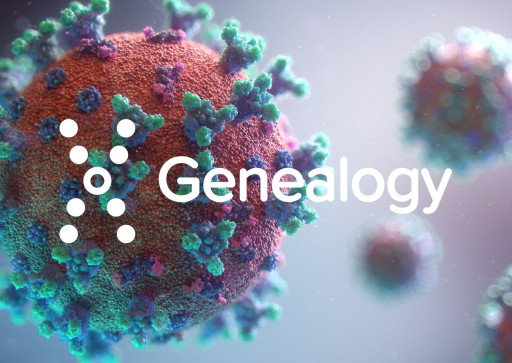Genealogy and Pulse Active Stations team up to examine genetic impact on COVID-19 severity
As COVID-19 continues to impact the Indian population, Genealogy and Pulse are teaming up to study how genetics play a role in the severity of the virus.
NEW YORK – June 11, 2021 – (Newswire.com)
Genealogy Inc. has made waves in the bioinformatics world for its efficient use of the full genome and high definition HLA sequencing capabilities. Their platform uses AI technology to accurately predict a person’s risk of developing genetic diseases and their genetic risk of cancer, at a fraction of the cost of traditional testing methods.
Using state-of-the-art AI algorithms, genealogy can generate a person’s ‘polygenic risk score’ or PRS, which can accurately predict the severity of COVID-19 symptoms based on genetic risk. They have completed their technology development phase and are ready to apply it to a real world scenario.
Recently, the company has focused on the deadly COVID-19 virus in hopes of using its groundbreaking algorithms to predict which viral infections could severely affect certain people as well as their potential response to mRNA vaccinations.
The biotech company developed its core technology with the aim of testing and preventing further deaths in high-impact countries like India. India continues to report an average of 58,000 cases per day and most experts expect reported cases to peak around mid-June.
In an effort to reduce severe cases and hospitalizations in India, Genealogy is partnering with Pulse Active Stations to genetically determine what makes infections more severe for some people or asymptomatic for others.
During their initial deployment, the companies analyzed the 450,000 Pulse users in 150 cities to identify groups of infected individuals who had no symptoms, those with mild symptoms, and those who needed hospitalization.
Identifying PRS in patients of different COVID severity levels will provide more detailed insight into the causes of symptoms, as well as possible treatment options. In addition, the partnership between Genealogy and Pulse will provide valuable insight into India’s underserved health markets and provide useful insight into how the virus is affecting populations.
Earlier this year, India broke world records for new infections and deaths from the coronavirus. The country ranks 102nd in the world for genetic sequencing and downloads only 0.49 sequences per 1,000 cases. Sequencing efforts could be dramatically increased by using artificial intelligence algorithms to ‘impute’ or predict datasets for the population as a whole.
Current research highlights two key areas where genetics could impact the severity of COVID: the chances of developing life-threatening inflammation and the chances of getting infected in the first place.
Simply put, some people seem to have a higher likelihood of developing severe COVID symptoms if they have a particular genetic makeup. But, unfortunately, researchers haven’t pinpointed which genes are responsible for creating extreme symptoms in some cases while they are almost non-existent in others.
Additionally, the lack of diverse research becomes evident when one considers all of the ethnically unique genomes present outside of North America, the research epicenter.
To address the issue of diversity in genetic studies of COVID-19, Genealogy CEO Andrew Chi and Joginder Tanikella, CEO of India’s Pulse, have joined forces to study the Indian population and their genetic sensitivities to coronavirus. Together, Genealogy and Pulse will be the first bioinformatics team to examine the genetic causes of the severity of COVID among the Indian population.
As the number of reported cases in India continues to rise, the country of 1.3 billion people has so far reported nearly 29 million confirmed cases. The vaccine rollout has brought little relief, and government officials don’t expect to achieve full coverage until the end of 2021.
By applying their precision health methods, Genealogy hopes to use its technology to identify individuals at higher risk of developing severe reactions to COVID and to vaccinate this at-risk group as a priority.
Additionally, by using a cost-effective saliva testing method to accurately predict HLA genotype information, the company can glean a wealth of information about the human immune system. This information will be invaluable in predicting negative vaccine responses using genetic data and in determining who should receive priority vaccination in the event of a new global pandemic.
Genealogy plans to finalize its AI pipeline by the end of 2021, which could be expanded to predict the severity of viral reactions, as well as the effectiveness of vaccinations against influenza and other deadly coronaviruses. Additionally, CEO Andrew Chi is hopeful that this technology could be used to save millions of lives if another deadly pandemic occurs.
Press Releases Department
through
Newswire.com
Primary source:
Genealogy and Pulse Active Stations team up to examine genetic impact on COVID-19 severity

